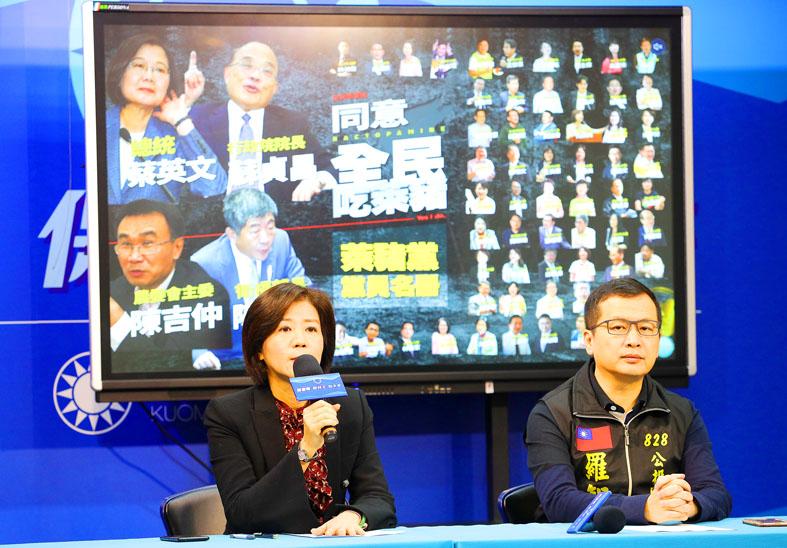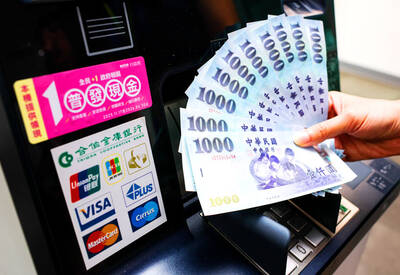The Chinese Nationalist Party (KMT) yesterday called on people to recall Democratic Progressive Party (DPP) lawmakers who pushed through executive directives to ease restrictions on US pork imports and to “thwart President Tsai Ing-wen’s (蔡英文) dictatorship through a referendum.”
Although ractopamine is banned for use in pigs in Taiwan because of concerns over its safety to animals and humans, Tsai on Aug. 28 announced that Taiwan would open up to imports of US beef from cattle 30 months or older and pork with acceptable levels of the leanness-enhancing drug.
The DPP, which holds 61 of the 113 seats in the Legislative Yuan, on Thursday pushed through the nine directives.

Photo: CNA
DPP lawmakers blocked opposition proposals to amend the Act Governing Food Safety and Sanitation (食品安全衛生管理法) and the School Health Act (學校衛生法) to ban ractopamine in food products, saying that the directives are sufficient to ensure food safety.
The policy, which is to go into effect on Friday next week, is widely viewed as an effort by the government to satisfy US prerequisites for negotiations on a bilateral trade deal.
Lawmakers from the KMT, the Taiwan People’s Party and the New Power Party objected to the policy, citing health concerns.
KMT Culture and Communications Committee director-general Alicia Wang (王育敏) told a news conference in Taipei yesterday that under the leadership of Tsai — the “ractopamine pork president” — almost all DPP lawmakers have turned a blind eye to public objections, even though they are elected representatives.
Wang cited a poll conducted by the KMT-affiliated National Policy Foundation last month that showed 70.6 percent of respondents opposed imports of pork products containing ractopamine residue.
DPP caucus whip Ker Chien-ming (柯建銘) threatened to discipline DPP legislators Lin Shu-fen (林淑芬), Liu Chien-kuo (劉建國) and Chiang Yung-chang (江永昌) because they refused to follow voting directions, Wang said.
Other DPP lawmakers made ridiculous arguments, including DPP Legislator Rosalia Wu (吳思瑤), who said that blocking US pork products might create trade barriers for Taiwan and benefit China, Wang said, asking what China has to do with the issue.
Tsai has become a dictator and even refuses to acknowledge her own inconsistency regarding importing products with ractopamine, KMT Culture and Communications Committee deputy chairwoman Lee Yong-ping (李永萍) said, urging people to put a check on the DPP administration’s arrogance.
KMT Institute of Revolutionary Practice director Lo Chih-chiang (羅智強) called on people to recall Wu and sign the KMT’s referendum petition to block pork products containing traces of the additive.
While restrictions on US pork products are to be lifted next week, the KMT’s referendum, if it is passed on Aug. 28, would force the government to stop such imports, Lo said.
The referendum, which was initiated by KMT caucus whip Lin Wei-chou (林為洲), asks people if they agree that the government should ban imports of all pork products containing leanness-enhancing substances, including ractopamine.
The Central Election Commission on Friday last week said that Lin’s referendum proposal met legal requirements and could start to gather signatures to meet the threshold of 290,000 needed in the second stage.
Additional reporting by CNA

The Central Weather Administration (CWA) today issued a sea warning for Typhoon Fung-wong effective from 5:30pm, while local governments canceled school and work for tomorrow. A land warning is expected to be issued tomorrow morning before it is expected to make landfall on Wednesday, the agency said. Taoyuan, and well as Yilan, Hualien and Penghu counties canceled work and school for tomorrow, as well as mountainous district of Taipei and New Taipei City. For updated information on closures, please visit the Directorate-General of Personnel Administration Web site. As of 5pm today, Fung-wong was about 490km south-southwest of Oluanpi (鵝鑾鼻), Taiwan's southernmost point.

Tropical Storm Fung-Wong would likely strengthen into a typhoon later today as it continues moving westward across the Pacific before heading in Taiwan’s direction next week, the Central Weather Administration (CWA) said. As of 8am, Fung-Wong was about 2,190km east-southeast of Cape Oluanpi (鵝鑾鼻), Taiwan’s southernmost point, moving westward at 25kph and possibly accelerating to 31kph, CWA data showed. The tropical storm is currently over waters east of the Philippines and still far from Taiwan, CWA forecaster Tseng Chao-cheng (曾昭誠) said, adding that it could likely strengthen into a typhoon later in the day. It is forecast to reach the South China Sea

Almost a quarter of volunteer soldiers who signed up from 2021 to last year have sought early discharge, the Legislative Yuan’s Budget Center said in a report. The report said that 12,884 of 52,674 people who volunteered in the period had sought an early exit from the military, returning NT$895.96 million (US$28.86 million) to the government. In 2021, there was a 105.34 percent rise in the volunteer recruitment rate, but the number has steadily declined since then, missing recruitment targets, the Chinese-language United Daily News said, citing the report. In 2021, only 521 volunteers dropped out of the military, the report said, citing

Nearly 5 million people have signed up to receive the government’s NT$10,000 (US$322) universal cash handout since registration opened on Wednesday last week, with deposits expected to begin tomorrow, the Ministry of Finance said yesterday. After a staggered sign-up last week — based on the final digit of the applicant’s national ID or Alien Resident Certificate number — online registration is open to all eligible Taiwanese nationals, foreign permanent residents and spouses of Taiwanese nationals. Banks are expected to start issuing deposits from 6pm today, the ministry said. Those who completed registration by yesterday are expected to receive their NT$10,000 tomorrow, National Treasury